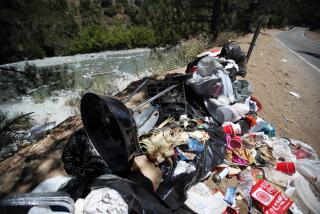Individuals Must Help Environment, Bush Says : Government, Industry, New Laws Cannot Solve Problems Alone, He Tells Crowd
- Share via
SPOKANE, Wash. — Declaring that the federal government, new laws and large industrial polluters cannot solve the nation’s environmental problems alone, President Bush said Tuesday that “we’re all responsible” and that the solutions must come from all elements of society--including individuals.
The answer to cleaning up the nation’s environment, he said, “lies in a shared sense of personal responsibility--a new environmental awareness--on the part of all Americans.” Bush originally had planned a visit Tuesday to Prince William Sound, the site of the Exxon Valdez oil spill last March. Instead, he spoke to a crowd gathered at a park on the banks of the once-polluted but now reclaimed Spokane River.
“So many of the big problems--coastal water pollution, pesticides in ground water, urban smog and municipal garbage--aren’t simply caused by large power plants and refineries,” the President said. “And many can’t be solved by national legislation alone.
“Millions of small, diverse sources contribute to these problems, including the everyday behavior of people at work and at home. Such overwhelming environmental challenges can be solved by individual determination that we can do better.
“Local communities, businesses large and small, individual families--all can learn to generate less waste and recycle more of the waste that is generated.”
Attending ceremonies marking the centennial of Washington state, Bush focused for the second day of his trip on environmental issues, including a repeated call for Congress to speed up work on the Clean Air Act amendments that he submitted on July 21.
“When it comes to clean air, we need action on the legislation we’ve proposed, now. Every day that passes is another day we’re postponing progress on clean air,” Bush said. “We’ve brought people together and put a sound proposal on the table. Now it is up to the Congress to pass this clean air legislation and pass it this year.”
The Administration clean air plan calls for large, mandatory reductions in carbon dioxide by the year 2000 and reductions of 75% to 90% in toxic emissions. It also calls for the use of alternative fuels in 1 million vehicles by 1997.
Meanwhile, in Washington, Administration supporters on a House Energy and Commerce subcommittee on health and the environment narrowly defeated an amendment that would have toughened the President’s clean air proposals.
The amendment by Rep. Henry A. Waxman, (D-Los Angeles) would have speeded up the deadline by which many severely polluted cities will have to meet federal clean air standards. It was defeated, 12 to 10.
Environmentalists expressed disappointment that the Waxman amendment was defeated but said the real fight to amend the bill will not begin until today, when the subcommittee takes up the most controversial section dealing with emissions from motor vehicles.
That battle is expected to pit Waxman, an ally of the environmentalists, against Rep. John D. Dingell (D-Mich.), who co-sponsored the Bush bill and represents the auto industry’s interests on the subcommittee. He is expected to resist changes in the measure beyond a set of concessions offered by the Administration earlier in the day.
Those concessions, which environmentalists dismissed as “cosmetic,” toughen the bill’s language on pollution from tall smokestacks, on motor vehicle maintenance and inspection requirements and on safeguarding the air quality in national parks.
They also modify one of the most controversial sections of the Bush bill, which allows automobile manufacturers to meet new pollution standards by averaging the emission of hydrocarbons, a major component of smog, among engine families. That provision has been criticized by environmentalists, who contend that averaging will only increase pollution. They are lobbying for a uniform standard for all new cars to meet.
Under the Administration’s new proposal, introduced by Rep. Norman F. Lent (R-N.Y.), averaging would still be allowed. However, the bill would specify that emissions from motor vehicles could not exceed the total emissions that would result if all cars were required to meet the emission standards.
In his speech, Bush declared that “we must find new ways to apply the creativity of the marketplace, in the service of the environment.”
“We have an opportunity to renew the environmental ethic in America--and to reassert U.S. leadership on environmental challenges around the world. That’s an opportunity we can’t afford to miss,” he said.
The President said that, in preserving the environment, “there’s a connection between the smallest individual action and widespread, global consequences.” And, he said, he rejects the argument that the nation “must yield to the extremes,” sacrificing either jobs or economic progress to end pollution.
“Who can argue with that?” Peter Koppleman, vice president of The Wilderness Society, said in Washington of the President’s call for greater individual responsibility. “But what this amounts to is a call for a million points of light. Instead, the federal government should be shining a floodlight on the entire issue.”
Koppleman said the Bush Administration falls short of its own standard. “A good place for the President to start providing environmental leadership would be to surround himself with people capable of carrying out his policies from a better environmental stance,” Koppleman said.
Throughout his visit here, Bush was accompanied by House Speaker Thomas S. Foley, the Democrat who has represented western Washington state in Congress since 1965.
The two, accompanied by Foley’s wife, dined together in a public restaurant Monday evening, and their faces were printed side-by-side--like candidates on the same political ticket--on buttons worn by members of the centennial celebration crowd.
Staff writers Kevin Davis and Michael Ross contributed to this story from Washington.
More to Read
Sign up for Essential California
The most important California stories and recommendations in your inbox every morning.
You may occasionally receive promotional content from the Los Angeles Times.











